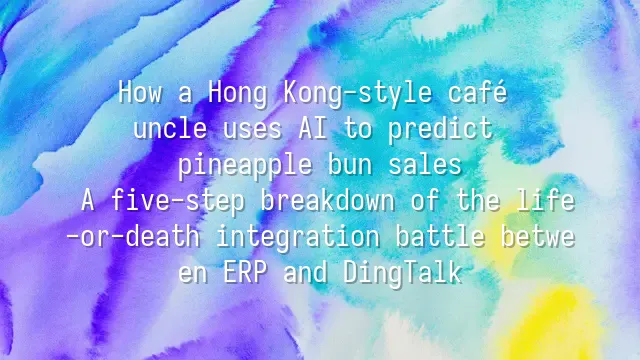
Digital Tsunami Sweeps Across Hong Kong
Whether DingTalk can integrate with common ERP/CRM systems in Hong Kong is no longer a niche topic for IT departments, but a survival issue bosses ask about three times a day at morning meetings. Traditional Hong Kong enterprises once believed they had achieved digital completeness after implementing ERP and CRM—only to find their systems operating in silos, like isolated fortresses that don't communicate. Tablet-based ordering and electronic order placement may seem like progress, but if data can't move autonomously, it's ultimately just a digital performance without real impact. The true challenge isn't merely having APIs, but establishing real-time communication between systems like SAP Business One, Oracle NetSuite, or even locally popular Speedy ERP and DingTalk. Many companies overlook the fact that integration failures are often not due to technical limitations, but stem from outdated business processes. This leads to delayed orders, inventory mismatches, and customers receiving surprise "blind boxes" instead of what they expected.
Smart Tools as the Breakthrough Solution
Viewing DingTalk’s integration with common Hong Kong ERP/CRM systems is akin to performing a nervous system rewiring surgery on an enterprise. In reality, 90% of SMEs don’t lack systems—they have too many: Excel spreadsheets, paper records, legacy accounting software, and Salesforce all used simultaneously, creating an information swamp. DingTalk’s strength lies not in replacing existing tools, but in acting as a "super translator": through API streaming, it automatically synchronizes scattered data. For example, when frontline staff place an order, it instantly triggers kitchen preparation, inventory deduction, and quotation generation—all without manual intervention. A retail store successfully integrated SAP with Zoho CRM using DingTalk at a fraction of the cost of custom development by an IT firm, and completed the project three weeks faster. The key point is that businesses don’t need to start from scratch—legacy systems can be revitalized for low-cost, high-efficiency transformation.
Cross-Border Payment: The Game-Changing Catalyst
The true value of DingTalk’s integration with common Hong Kong ERP/CRM systems only becomes fully apparent when financial flows are involved. Since 2023, DingTalk has established multiple cross-border data tunnels, supporting dynamic synchronization with mainstream systems such as Deltek, Kingdee Cloud, and Salesforce. Imagine: a sales opportunity update instantly triggers changes in CRM follow-up stages, while the ERP automatically generates quotations and embeds financial approval workflows—forming a "sandwich-style integration." Even further, for enterprises juggling multiple legacy systems, DingTalk supports middleware deployment, effectively serving as a digital intermediary. In the future, AI modules will be introduced to automatically recommend restocking levels based on CRM sales trends, enabling even warehouse staff to fulfill orders using smart alerts—eliminating reliance on gut-feel decisions from management.
Treatment Room for Transformation Pains
On the surface, whether DingTalk can integrate with common Hong Kong ERP/CRM systems appears to be a technical issue, but in reality, it's a process of corporate DNA restructuring. A common scenario in family-run businesses: owners insist on personally reviewing every approval flow, while subordinates want to use DingTalk for quick responses; CRM customer tiering clashes with automation bots, causing high-value clients to be mistakenly assigned to interns. These generational mismatches result in fragile, repeatedly breaking "pseudo-integrations." The solution goes beyond API bridging—it requires role-based data mapping: different job levels see different data layers, with clear definitions of approval authority. Successful cases show that through centralized API management, DingTalk can transform from a chaos generator into a collaboration catalyst—the key lies in upgrading both technology and management systems simultaneously.
Future Ecosystem, Tomorrow’s Blueprint
Whether DingTalk can integrate with common Hong Kong ERP/CRM systems will determine whether a company qualifies to participate in the next-generation business ecosystem. As Web3.0 begins to penetrate supply chain traceability, forward-thinking companies are already turning customer behavior records into tradable digital assets. Imagine: a cha chaan teng (Hong Kong-style café) member spends HK$100 on dim sum—the purchase history isn't just stored in the CRM, but converted into an NFT-based loyalty token, tradable in a metaverse marketplace. The CRM of the future won't just manage relationships—it will cultivate a membership economy spanning physical and virtual worlds. As a data hub, DingTalk is gradually evolving into the enterprise’s central nervous system, driving comprehensive transformation from within. Truly grounded digitalization isn't about swapping tools—it's about reshaping mindset and ecosystem.
Using DingTalk: Before & After
Before
- × Team Chaos: Team members are all busy with their own tasks, standards are inconsistent, and the more communication there is, the more chaotic things become, leading to decreased motivation.
- × Info Silos: Important information is scattered across WhatsApp/group chats, emails, Excel spreadsheets, and numerous apps, often resulting in lost, missed, or misdirected messages.
- × Manual Workflow: Tasks are still handled manually: approvals, scheduling, repair requests, store visits, and reports are all slow, hindering frontline responsiveness.
- × Admin Burden: Clocking in, leave requests, overtime, and payroll are handled in different systems or calculated using spreadsheets, leading to time-consuming statistics and errors.
After
- ✓ Unified Platform: By using a unified platform to bring people and tasks together, communication flows smoothly, collaboration improves, and turnover rates are more easily reduced.
- ✓ Official Channel: Information has an "official channel": whoever is entitled to see it can see it, it can be tracked and reviewed, and there's no fear of messages being skipped.
- ✓ Digital Agility: Processes run online: approvals are faster, tasks are clearer, and store/on-site feedback is more timely, directly improving overall efficiency.
- ✓ Automated HR: Clocking in, leave requests, and overtime are automatically summarized, and attendance reports can be exported with one click for easy payroll calculation.
Operate smarter, spend less
Streamline ops, reduce costs, and keep HQ and frontline in sync—all in one platform.
9.5x
Operational efficiency
72%
Cost savings
35%
Faster team syncs
Want to a Free Trial? Please book our Demo meeting with our AI specilist as below link:
https://www.dingtalk-global.com/contact

 English
English
 اللغة العربية
اللغة العربية  Bahasa Indonesia
Bahasa Indonesia  Bahasa Melayu
Bahasa Melayu  ภาษาไทย
ภาษาไทย  Tiếng Việt
Tiếng Việt  简体中文
简体中文 